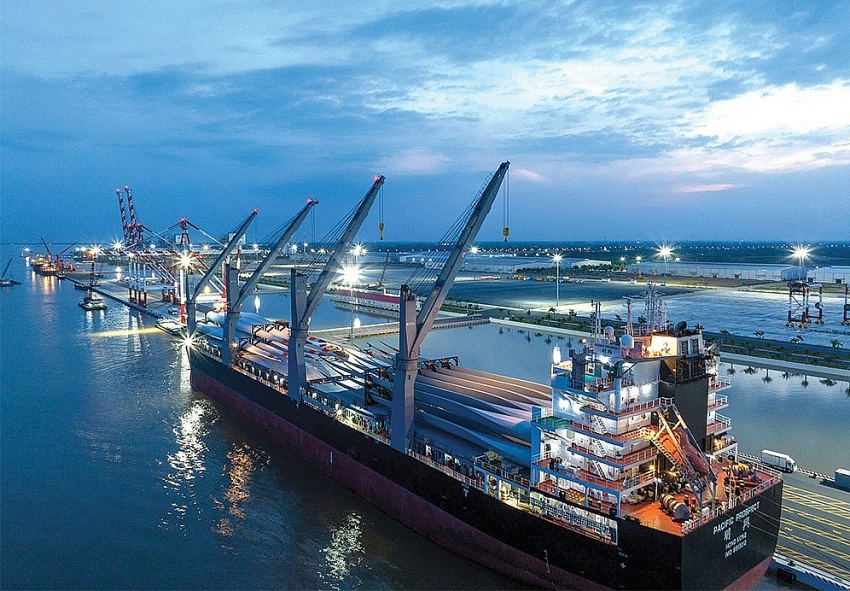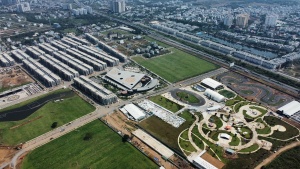Future trends and benefits in Vietnam’s logistics sector
Vietnam currently ranks 43rd globally in the Logistics Performance Index, positioning itself among the top five ASEAN countries in logistics, alongside Singapore, Malaysia, and Thailand. The country is now home to roughly 30 global corporations and over 34,000 Vietnamese companies offering logistics services.
 |
| Melissa Cyrill, an expert at Dezan Shira and Associates |
As of Q3, the sector’s profits increased 22 per cent on-year, equivalent to VND8.1 trillion ($337.5 million). In the first nine months of this year, the sector is projected to generate VND24.4 trillion (approximately $1 billion) in profit, an 18 per cent increase compared to the same period in 2023. Seaport operations grew 20 per cent in cargo volume from the previous year.
The logistics sector growth is fuelled by Vietnam’s strong import-export activities, which experienced a 16.7 per cent increase, reaching more than $511 billion in the first eight months of 2024. The export sector continues to be a key driver of this growth, with major trading partners like the US, EU, and China indicating higher demand and increased orders.
Additionally, the exponential growth of e-commerce, which is expected to reach $52 billion by 2025, will further drive the need for advanced logistics solutions, especially in last-mile delivery and supply chain management.
The logistics sector in Vietnam is considered a specialised business, with foreign direct investment (FDI) limited to 100 per cent ownership in only a few areas. Therefore, FDI primarily focuses on projects for warehousing services and freight agency services.
After the pandemic and supply chain disruptions, FDI in the logistics sector exhibited signs of recovery, with a notable increase to 72 and 177 projects in 2022 and 2023, respectively. Regarding total registered capital, the industry demonstrated consistent on-year growth of 1.27 per cent in 2023 with $463 million.
During the first nine months of 2024, the sector experienced a substantial surge in total registered capital, surpassing the 2023 figure and reaching $558.6 million. This growth trajectory suggests that Vietnam’s logistics industry is becoming increasingly attractive to foreign investors, potentially leading to improvement in standards and professionalism in the sector.
Global trends impact logistics
Regarding the impact of global trade shifts, we have observed that the China+1 strategy and supply chain diversification have made Vietnam a favoured manufacturing destination, presenting an opportunity for the country to enhance the logistic sector.
 |
| Photo: Le Toan |
In addition, Vietnam’s “bamboo diplomacy” has fostered friendly relations regionally and globally, making the country a favourable choice for investors amid global challenges.
In the regional supply chain diversification, Vietnam’s participation in key free trade agreements offers access to a vast network of trading partners and drives demand for streamlined logistics services. The country’s strategic location within ASEAN gives it a competitive edge as a regional hub for logistics in Southeast Asia and major global markets like the US, Europe, and East Asia.
Meanwhile, the rise of e-commerce has transformed logistics globally, requiring more adaptive warehousing solutions and more efficient delivery models.
Different e-commerce giants are operating in Vietnam, including Amazon, Alibaba, Tao Bao, Shopee, and Lazada. This e-commerce boom offers logistic providers an opportunity to innovate their services, meeting the evolving needs for specialised logistics services (same-day delivery, returns management, and automated fulfilment centres).
The integration of automation in logistics has significantly impacted e-commerce, particularly in reducing delivery times. Automated systems have streamlined sorting and packing processes, minimising errors and substantially improving delivery efficiency.
Digitalisation is reshaping Vietnam’s logistics sector, driving efficiency, cost savings, and improved service delivery. Technologies like blockchain, AI, and the Internet of Things are transforming logistics operations, from inventory tracking to supply chain visibility.
Sustainability has become a key focus in the global logistics industry. Green logistics aims to implement environmentally friendly practices throughout the supply chain, from procurement to waste management. This approach helps minimise the sector’s environmental impact while contributing to sustainable development.
In response, Vietnam is embracing green logistics trends. Major cities like Ho Chi Minh City are piloting sustainable transportation solutions, such as electric vehicles for last-mile deliveries to reduce carbon emissions.
Additionally, modern logistics centres are adopting eco-friendly designs, including solar-powered facilities and energy-efficient lighting and insulation systems. These green logistics practices align with global sustainability goals and help firms reduce operational costs.
The green growth national strategy for 2021-2030 seeks to green economic sectors by promoting economic restructuring, innovative growth models, and ensuring environmental sustainability and social equity. To support this strategy, a national action plan on green growth was also issued, identifying logistics services as one of its 18 key focus areas.
Policy recommendations
According to Agility Emerging Market Index 2024, Vietnam is among the world’s top 10 emerging logistics markets. To guarantee the sustainable development of the country’s logistics sector, sufficient public and private sector efforts are needed to consolidate this position.
Encouraging public-private partnerships (PPPs) in infrastructure development is a key priority. For infrastructure development, PPPs are considered the optimal model to attract investments from both domestic and foreign investors. This approach has proven successful in enhancing the investment and operational management of dry ports, logistics parks, and related platforms.
In this context, the European Chamber of Commerce in Vietnam is providing solutions to implement effective PPP projects, including developing a pipeline of viable and visible projects, improving capacity and coordination among government agencies, and rationalising detailed implementing regulations.
Moreover, establishing multimodal transportation hubs to improve connectivity is another priority. These hubs will accommodate the growing demand for high-volume transportation, reduce costs, enhance traffic safety, and promote environmental protection.
Integrating roads, inland waterways, and sea routes through these transport hubs will significantly boost logistics efficiency, stimulate investment, and support economic growth. Goods from industrial parks can then be transported via road or rail to airports, inland ports, and seaports, maximising logistical advantages across the supply chain.
Businesses in Vietnam’s logistics sector have placed greater emphasis on digital applications in recent years. Still, the growth of e-logistics has yet to fully realise its potential in the country.
As most of Vietnam’s logistics firms are small or medium-sized, they often experience financial and human resource restraints in their attempt at digital transformation. This requires suitable support policies and programmes from relevant authorities, such as developing policy framework and tools to guide digital transformation in logistics, improving the operational efficiency of electronic information portals, and improving the capacity of digital transformation consultants in line with international standards.
Apart from those, other solutions are connecting experts with enterprises in need of digital transformation, organising digital transformation training courses for enterprises, and implementing financial support packages and technology solution instructions for enterprises suitable to the enterprise’s scale, field, and industry.
As a key economic sector, Vietnam’s logistics sector must align with the global shift towards sustainability by adopting green energy and environmentally friendly practices.
To develop and maintain a green logistics sector, targeted measures are required. These include reducing carbon emissions across operations and administration, promoting multimodal transport, enhancing the legal framework for green logistics, implementing legislation to support green initiatives, encouraging green practices among small businesses, and introducing a Green Logistics Performance Index.
Vietnam’s logistics sector is at a pivotal juncture, with global trends such as trade diversification, e-commerce growth, and sustainability shaping its future and immense investments in improved infrastructure on the way. By continuing to invest in green logistics practices and adopting advanced technologies, Vietnam can solidify its position as a regional logistics hub and capitalise on the opportunities presented by shifting global supply chains.
| Vietnam’s logistics sector is rapidly evolving, fuelled by the country’s rise as a global manufacturing hub and its strategic position within Southeast Asia. It contributes approximately 4.5 per cent of the total GDP and in 2025, the sector’s growth rate is expected to exceed that of the country’s GDP. The market is projected to reach $71.88 billion by 2030, with an estimated compound annual growth rate of 6.75 per cent between now and the end of the decade. |
 | Impetus set for a new journey in Vietnam’s logistics sector Thanks to the state’s investment attraction policy, domestic and foreign private funding has contributed to the rapid development of our country’s logistics service industry. |
 | Logistics sector a golden egg for progress across Vietnam Vietnam has been the top choice for global investors in terms of logistics industrial sectors in Asia-Pacific. Trang Bui, country head of Cushman & Wakefield Vietnam, determines how this came to be, and analyses the tasks set towards 2030. |
 | New resolution opens opportunities for logistics sector At the beginning of 2023, Vietnam set its sights on becoming a high-income developed country, and the past year has demonstrated Ho Chi Minh City’s efforts to overcome challenges and reclaim its position as a regional economic powerhouse. Kiet Le, research lead, Manufacturing Group at Dezan Shira & Associates, shares his views on how the city can utilise its initiatives to make future breakthroughs. |
 | Mergers and acquisitions slow going in logistics sector until risks subside Mergers and acquisitions in the logistics industry are yet to thrive this year, as economic headwinds continue to prevent major movements. |
 | Vietnam's logistics sector hardest hit by Typhoon Yagi Vietnam's logistics sector was hit hard by Typhoon Yagi, with 82.4 per cent of businesses facing severe or moderate impacts, according to a new report by CEL. |
What the stars mean:
★ Poor ★ ★ Promising ★★★ Good ★★★★ Very good ★★★★★ Exceptional
Related Contents
Latest News
More News
- Citi economists project robust Vietnam economic growth in 2026 (February 14, 2026 | 18:00)
- Sustaining high growth must be balanced in stable manner (February 14, 2026 | 09:00)
- From 5G to 6G: how AI is shaping Vietnam’s path to digital leadership (February 13, 2026 | 10:59)
- Cooperation must align with Vietnam’s long-term ambitions (February 13, 2026 | 09:00)
- Need-to-know aspects ahead of AI law (February 13, 2026 | 08:00)
- Legalities to early operations for Vietnam’s IFC (February 11, 2026 | 12:17)
- Foreign-language trademarks gain traction in Vietnam (February 06, 2026 | 09:26)
- Offshore structuring and the Singapore holding route (February 02, 2026 | 10:39)
- Vietnam enters new development era: Russian scholar (January 25, 2026 | 10:08)
- 14th National Party Congress marks new era, expands Vietnam’s global role: Australian scholar (January 25, 2026 | 09:54)

 Tag:
Tag:



















 Mobile Version
Mobile Version